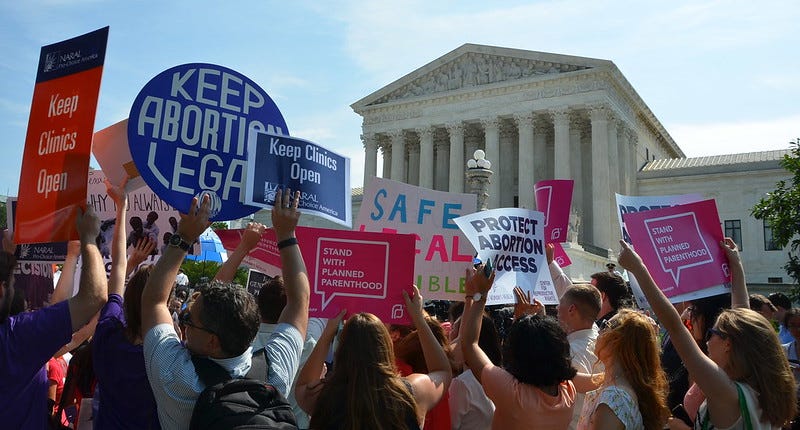Wake Up To Politics - December 1, 2021
Wake Up To Politics: The biggest abortion case in decades
by Gabe Fleisher
Good morning! It’s Wednesday, December 1, 2021. Election Day 2022 is 342 days away. Election Day 2024 is 1,070 days away.
Happy December. As I covered yesterday, it will be a busy month in Congress. But this morning, we’re turning our attention to the Supreme Court. Thanks for tuning in to Wake Up To Politics on this Wednesday morning:
Supreme Court to consider most consequential abortion case in decades
Abortion will land back before the Supreme Court today, as the justices consider Dobbs v. Jackson Women’s Health Organization, their most consequential case on the topic in decades.
Wake Up To Politics legal contributor Anna Salvatore offers this briefing on what you should know ahead of today’s case:
→ Background of the case: A little over three years ago, Mississippi banned most abortions after fifteen weeks of pregnancy to prevent the “medical, emotional, and psychological consequences” of abortion. District Judge Carlton Reeves soon struck down the law; in an unusually cutting opinion, he suggested the state legislature was “bent on controlling women and minorities.”
The same law is now before the Supreme Court this morning, where the justices will consider whether states can ban abortions before viability, the point — generally around 23 weeks — at which fetuses can survive outside the womb.
→ Abortion at the Supreme Court: In the court’s most famous abortion case, Roe v. Wade (1973), the justices ruled that women are entitled to an abortion in the first trimester.
However, their ruling in Planned Parenthood v. Casey (1992) later moderated that right; the court held that the government can’t “unduly interfere” with access to abortions before fetal viability, creating a vague standard over which conservative and liberal judges disagree.
In Dobbs, the six-justice conservative majority on the court could further weaken or even overturn the abortion protections set in Roe, accepting the Mississippi law’s 15-week cutoff instead of the current cutoff around 23 weeks.
→ Why it matters: This case is not just about Mississippi. If the Supreme Court upholds this law, then other Republican-led states will feel empowered to pass similar laws restricting women’s access to abortion. According to Politico, pro-life groups are already drafting bills modeled after the Mississippi law to restrict abortions in other states.
If Roe is overturned completely, near or total abortion bans would automatically go into effect in 22 states.
→ Justices to watch: Chief Justice John Roberts will be a key figure. Even though he’s predisposed to rule against abortion, he’s perhaps even more wary of the Supreme Court appearing hyper-partisan by overturning Roe. Roberts could plausibly vote either way in this case, and if he joins the conservatives, he might have a moderating influence on the final ruling.
→ Where public opinion stands: According to a Pew Research poll from earlier this year, 59% of Americans think that abortion should be legal in all or most cases, while 39% think it should be illegal in all or most cases.
→ When we’ll have a ruling: We can expect a final ruling next May or June. The opinion may even be released on the last day of the term, since the most controversial cases often lead to time-consuming concurrences, dissents, and vote-switching.
→ How to listen in: Arguments begin this morning at 10 a.m. Eastern Time. You can listen to the live audio through C-SPAN.
What else you should know
→ A new Covid pill. “A panel of experts convened by the Food and Drug Administration voted by a slim margin on Tuesday to recommend the agency authorize the Covid treatment developed by Merck and partner Ridgeback Biotherapeutics, after a vigorous debate about the risks and benefits of the first oral drug to combat the SARS-CoV-2 virus.” STAT News
Related: All 44 confirmed cases of the Omicron variant in the European Union are mild or asymptomatic, Bloomberg reports.
→ January 6 investigation. “Mark Meadows, who served as former President Donald Trump’s last chief of staff and was involved in efforts to challenge the 2020 election results, is now cooperating with the House select committee investigating the Jan. 6 Capitol attack.” ABC News
Plus: Meadows will be out with a new book next week, in which he’ll reveal that former President Trump tested positive for Covid-19 three days before his first debate against President Biden, per The Guardian.
→ Inside the House GOP. “House Republicans Nancy Mace and Marjorie Taylor Greene are in a public and highly personal feud over abortion and religion, amid the ongoing fallout from Islamophobic remarks by some GOP lawmakers.” Washington Post
→ 2022 watch. “Dr. Mehmet Oz, a physician known to national TV audiences, announced Tuesday that he will run for the Senate in Pennsylvania as a Republican, throwing more uncertainty into the closely watched primary.” NBC News

Policy Roundup: Global
Every Wednesdays, Wake Up To Politics contributor Miles Hession breaks down the week’s top international news:
Xiomara Castro appears to have won a stunning victory against the ruling party in Honduras to become the nation’s first woman president. Castro’s election will mark the end of the 12-year rule of the National Party that began following a 2009 coup that removed Castro’s husband, former leftist president Manuel Zelaya, from office. The wave of support for Castro represent a clear rejection of the National Party, which became mired in accusations of corruption, anti-democratic practices, and links to drug cartels. The election also marked a peaceful transition of power for the nation which had suffered heavily from a contested 2017 election that raised accusations of electoral fraud linked to the National Party.
Castro ran and was elected on a socialist platform, but as the race tightened, she moderated her rhetoric, leaving it unclear exactly how she will lead. Castro’s foreign policy will also be closely-watched: if she resumes an alliance with Venezuela and Cuba, she risks alienating Western allies like the U.S., which has been accused of propping up and supporting the National Party’s rule. Castro ran on a platform which included stronger ties with China, sending a worrying signal to U.S. leadership desperate for allies in Central America to stymie migration.
Iran and the U.S. maintained hardline stances in recent rounds of talks to re-establish the Iran nuclear deal. The Iranian envoy further upped the ante, not only calling for the immediate removal of existing sanctions but also for an assurance that the U.S. and its allies will not impose sanctions on Iran again. To emphasize this, Iran’s lead negotiator Ali Bagheri Kani brought a delegation of economic officials to the talks, underscoring the dire economic situation Iran finds itself in under new sanctions. These demands will be largely ignored in Washington, which has maintained its own position that compliance to the previous nuclear deal is required before any sanctions can be lifted.
While this impasse seems insurmountable, Iran hasn’t walked away completely. Importantly, talks are still continuing about lifting sanctions, reflecting the urgent desire by the Iranian government for them to be removed. European negotiators remain optimistic about the utility of these talks, but it is unclear what, if any, concessions will be made by either side.

More global headlines, via Miles:
After becoming the first woman to hold the office, and then quickly resigning after her coalition collapsed, Magdalena Andersson was named prime minister of Sweden again.
Barbados has become a republic after the government renounced the Queen of England and swore in a new head of state.
The prime minister of Poland has called on NATO leaders to fight Russian destabilization of Eastern Europe amid growing tensions.
200 people were arrested and many were injured during a recent bout of protests in Iran focused on water shortages in the country.
Abiy Amhed, the prime minister of Ethiopia, has launched a new offensive to reclaim land from Tigrayan rebels as the conflict continues to devolve.
Daybook
All times Eastern.
→ President Joe Biden will receive his daily intelligence briefing at 9:30 a.m. Later, at 12:35 p.m., he will deliver remarks on “his administration’s work to strengthen the nation’s supply chains, lower everyday costs for families, and ensure that shelves are well-stocked this holiday season.” (The speech was originally scheduled for Monday, but was postponed by the White House.)
At 2:30 p.m., Biden will deliver remarks to “commemorate World AIDS Day, launch the National HIV/AIDS Strategy, and kick off the Global Fund Replenishment process.” Secretary of Health and Human Services Xavier Becerra will also speak. At 5:30 p.m., the president and First Lady Jill Biden will host a menorah lighting in celebration of Hannukah.
→ Vice President Kamala Harris will convene a meeting of the National Space Council at 1:30 p.m. at the U.S. Institute of Peace. This will be the first meeting of the council in the Biden era; like past vice presidents, Harris is the council’s chair.
At 5:30 p.m., Harris and Second Gentleman Doug Emhoff — the first Jewish spouse of a president or vice president — will participate in the White House menorah lighting.
→ White House Press Secretary Jen Psaki will hold her daily press briefing at 1:30 p.m. Dr. Anthony Fauci, the president’s chief medical adviser, will also take questions.

→ The Senate will convene at 12 p.m. and resume consideration of H.R. 4350, the National Defense Authorization Act. The chamber may vote on 21 amendments to the annual defense policy bill today, after Senate Republicans called for amendment votes while blocking the measure from advancing this week.
→ The House will convene at 10 a.m. and hold a possible vote on an as-yet-released continuing resolution (CR) to extend government funding into 2022. (Government funding is currently set to expire at midnight Friday; the CR is likely to extend funding through mid-January, although the date has not yet been finalized.)
The chamber may also vote on up to 20 pieces of legislation under “suspension of the rules”:
H.R. 2930, the Safeguard Tribal Objects of Patrimony Act
H.R. 4352, to amend the Act of June 18, 1934, to reaffirm the authority of the Secretary of the Interior to take land into trust for Indian Tribes
H.R. 897, the Agua Caliente Land Exchange Fee to Trust Confirmation Act
H.R. 2074, the Indian Buffalo Management Act
H.R. 3531, the Women Who Worked on the Home Front World War II Memorial Act
H.R. 4706, the Blackwell School National Historic Site Act
H.R. 5720, the Courthouse Ethics and Transparency Act
H.R. 5677, to make technical amendments to update statutory references to certain provisions classified to title 2, United States Code, title 50, United States Code, and title 52, United States Code
H.R. 5679, to make technical amendments to update statutory references to certain provisions classified to title 7, title 20, and title 43, United States Code
H.R. 5695, to make technical amendments to update statutory references to certain provisions which were formerly classified to chapters 14 and 19 of title 25, United States Code
H.R. 5705, to make technical amendments to update statutory references to provisions reclassified to title 34, United States Code
H.R. 5961, to make revisions in title 5, United States Code, as necessary to keep the title current, and to make technical amendments to improve the United States Code
H.R. 5982, to make revisions in title 51, United States Code, as necessary to keep the title current, and to make technical amendments to improve the United States Code
H.R. 2685, the Understanding Cybersecurity of Mobile Networks Act
H.R. 4045, the FUTURE Networks Act
H.R. 4055, the American Cybersecurity Literacy Act
H.R. 2355, the Opioid Prescription Verification Act
H.R. 2364, the Synthetic Opioid Danger Awareness Act
H.R. 3743, the Supporting the Foundation for the National Institutes of Health and the Reagan-Udall Foundation for the Food and Drug Administration Act
H.R. 3894, the CARING for Social Determinants Act
→ The House Financial Services Committee will hold a hearing at 10 a.m. on the federal response to the pandemic, featuring testimony from Treasury Secretary Janet Yellen and Federal Reserve Chairman Jay Powell.
→ The House Energy and Commerce Subcommittee on Communications and Technology will hold a hearing at 10:30 a.m. to holding Big Tech companies accountable through reforms to Section 230 of the Communications Decency Act. Frances Haugen, the Facebook whistleblower, will be one of the witnesses.
→ The House Select Committee to Investigate the January 6th Attack on the U.S. Capitol will hold a business meeting at 7 p.m. to vote on whether to refer former Trump Justice Department official Jefrrey Clark, who has refused to cooperate with the panel’s inquiry, for criminal contempt of Congress.
If the panel votes to refer Clark for contempt, the full House would then have to vote on the referral as well before it would go to the U.S. attorney for the District of Columbia, who would decide whether to prosecute. Clark would be the second former Trump administration official referred for criminal contempt by the January 6 committee; former Trump strategist Steve Bannon was indicted after his own contempt referral last month.
→ The Supreme Court will hear oral arguments at 10 a.m. in Dobbs v. Jackson Women’s Health, one of the most significant abortion cases to come before the justices in decades.






